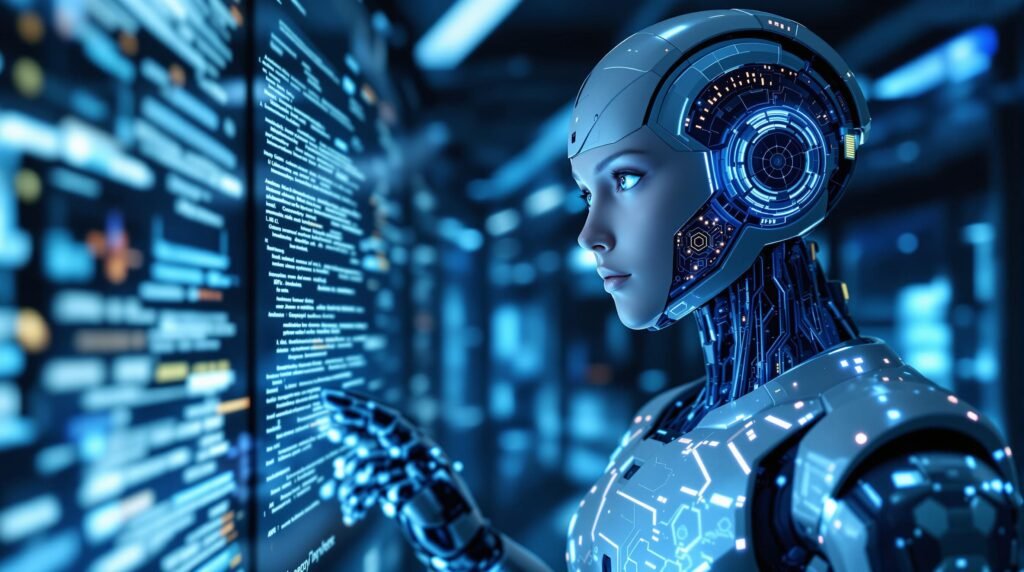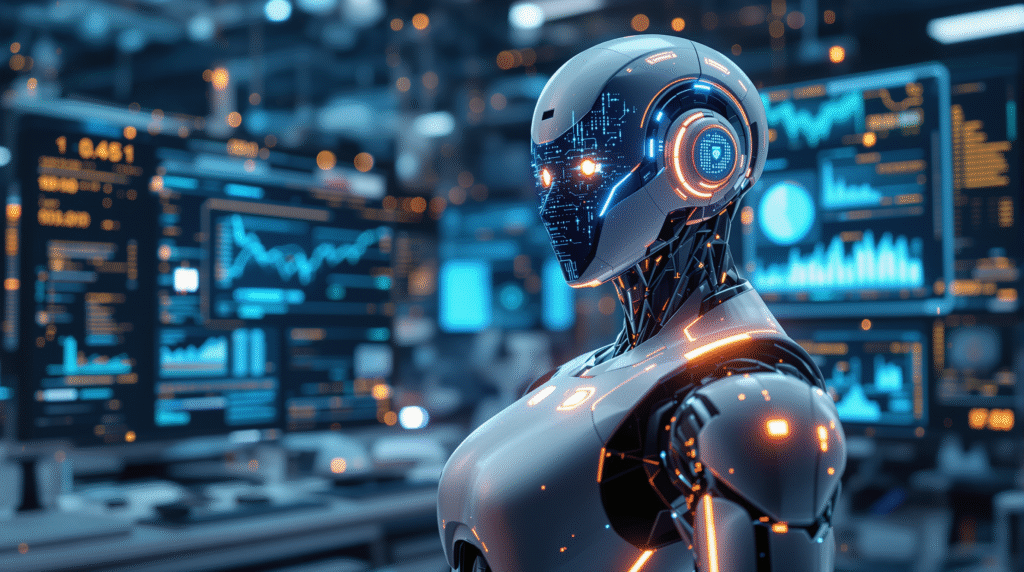Introduction: What are AI Agents and Why Should You Be Interested?
Artificial Intelligence (AI) is a field that is dynamically changing the world around us. One of its most important elements is AI agents – programs or systems that can independently make decisions, learn from data, and react to changing conditions. AI agents are present in many aspects of our lives: from voice assistants in smartphones, through recommendation systems in online stores, to autonomous vehicles and smart homes.
Why should you be interested in AI agents? Primarily because their role in the economy and everyday life will continue to grow. The ability to understand, design, and implement AI agents opens doors to modern professions, allows you to automate repetitive tasks, and create innovative solutions. Even basic knowledge of AI agents can help you better understand how modern technologies work and how they can be used in practice.
Basic Concepts: Environment, Perception, Action, and Agent Goal
To understand how an AI agent functions, it’s worth knowing a few key concepts:
Environment – this is everything that surrounds the agent and with which it can interact. The environment can be both the physical world (e.g., a room where a robot operates) and a virtual space (e.g., a computer game or a website).
Perception – this is the agent’s ability to receive information from its environment. This can be reading the temperature, recognizing an image from a camera, analyzing text, or listening to voice commands. The better the perception, the more effectively the agent understands what is happening around it.
Action – this is the agent’s reaction to stimuli from the environment. An action can be, for example, turning on the light, sending a response to a user, changing the direction of travel, or triggering an alarm. The agent chooses an action based on an analysis of the situation and its goal.
Agent Goal – every AI agent has a specific goal it strives to achieve. This can be, for example, maintaining the right temperature in a room, providing a correct answer to a user’s question, or optimizing a travel route. The goal determines what actions the agent considers best in a given situation.
Understanding these concepts is the foundation for starting your adventure with AI agents and creating your first simple projects.
Types of AI Agents: From Simple to Intelligent
AI agents can differ in their level of complexity and range of capabilities. The simplest ones operate according to fixed rules—they react to specific stimuli in a predetermined way. An example might be an agent that turns on the light when the brightness level drops below a set threshold.
More advanced agents have memory and can learn from previous experiences. Thanks to this, they can make better decisions in the future by analyzing the outcomes of their past actions. Even more intelligent systems use machine learning to independently recognize patterns and adapt their behavior to changing conditions.
We distinguish, among others:
Reactive agents – act based on current stimuli, without memory of the past.
Agents with limited memory – remember some information from the past, which allows them to better respond to recurring situations.
Learning agents – use machine learning algorithms to improve their actions based on data and experience.
Multi-agent systems – cooperate with other agents, exchanging information and jointly accomplishing tasks.
Tools and Technologies: Programming Languages, Libraries, and Frameworks
To start working with AI agents, it’s worth getting to know the tools and technologies that make their creation easier. The most popular programming language in this field is Python—it’s easy to learn and offers a rich ecosystem of artificial intelligence libraries.
The most important libraries and frameworks include:
scikit-learn – ideal for learning the basics of machine learning and building simple agents.
TensorFlow and PyTorch – powerful tools for creating advanced deep learning models.
OpenAI Gym – an environment for testing and training agents in various simulations.
spaCy and NLTK – libraries for natural language processing, useful for building chatbots and voice assistants. It’s also worth using ready-made online courses, documentation, and developer communities, which help solve encountered problems and develop your own projects.
python
Copy Code
class HeatingAgent:
def __init__(self, threshold_temp):
self.threshold_temp = threshold_temp
def observe_and_act(self, current_temp):
if current_temp < self.threshold_temp:
return "Turn on heating"
else:
return "Heating off"
agent = HeatingAgent(threshold_temp=20)
print(agent.observe_and_act(current_temp=18)) # Turn on heating
print(agent.observe_and_act(current_temp=22)) #Heating offTraining the Agent: Introduction to Machine Learning
Simple agents operate according to fixed rules, but more advanced systems can learn from data and experience. Machine learning allows agents to analyze patterns, predict the outcomes of actions, and adapt their decisions to changing conditions.
An example might be a movie recommendation agent. At first, the agent may suggest the most popular titles, but over time, by analyzing the user’s choices, it begins to better understand their preferences and offer increasingly accurate recommendations. For this purpose, it uses machine learning algorithms that learn from the user’s choice history.
Machine learning opens up new possibilities for AI agents—it allows them to recognize images, analyze text, and even predict future events. Thanks to this, agents are becoming increasingly intelligent and versatile.
Application Examples: Where Are AI Agents Already Used?
AI agents are present in many areas of our lives, often without us even realizing it. In online stores, agents recommend products based on our previous purchases and preferences. In banking, they analyze transactions, detect fraud attempts, and support customer service through chatbots. In medicine, they help analyze test results, support diagnostics, and personalize treatment plans. In smart homes, agents control lighting, heating, or security systems, adjusting settings to the presence of residents and the time of day. In transportation, AI agents optimize travel routes, manage urban traffic, and support autonomous vehicles. Even in entertainment—on streaming platforms—agents analyze our choices and suggest movies, series, or music that we might like.
Next Steps: How to Develop Your Skills in the Field of AI Agents?
If you want to develop in the area of AI agents, start by learning the basics of programming, preferably in Python. Get to know popular libraries and frameworks such as scikit-learn, TensorFlow, PyTorch, or OpenAI Gym. It’s worth using online courses, tutorials, and documentation to help you understand how to build and train your own agents.
The next step is to experiment with simple projects—you can create an agent that controls lighting, a simple chatbot, or a recommendation system. Over time, you can move on to more advanced topics such as reinforcement learning, natural language processing, or building multi-agent systems.
Don’t forget to actively participate in the AI community—forums, discussion groups, and hackathons are great places to exchange experiences and gain inspiration.
Summary: AI Agents – The Future of Artificial Intelligence
AI agents are one of the most important directions in the development of modern artificial intelligence. Thanks to them, it is possible to automate everyday activities, personalize services, and solve complex problems in business, medicine, or education. Starting your adventure with AI agents does not require advanced knowledge—curiosity, willingness to learn, and readiness to experiment are enough.
It’s worth keeping up with news in this field, developing your skills, and building your own projects. AI agents are a technology that is already changing the world—and in the future, their role will only grow.


